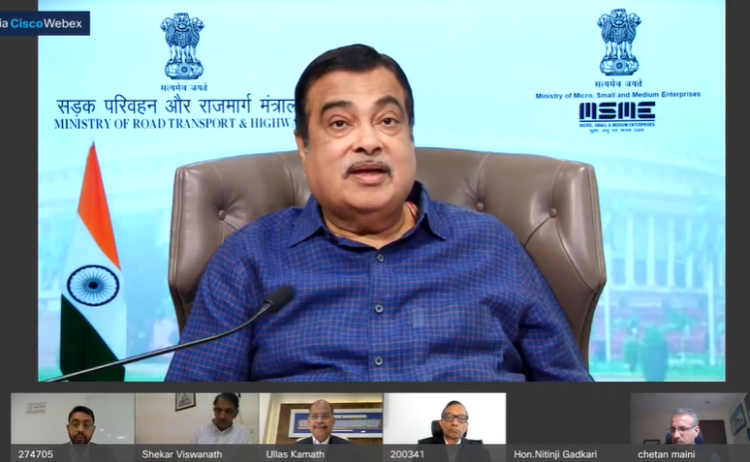Gadkari urges FICCI to come up with integrated approach for developing EV sector
Shri Gadkari also emphasised promoting the use of biofuels like CNG, LNG and informed that he would soon launch tractors run on Bio-CNG.

- Country:
- India
Shri Nitin Gadkari, Minister of Road Transport and Highways & MSME, Govt of India, today said that the government is working towards making India a global automobile manufacturing hub in the next five years. The government is already making policies to support the industry, he added.
Addressing the virtual ‘Electric Mobility Conference 2020’, organized by FICCI Karnataka State Council, Shri Gadkari said, “The future is very bright and India has the potential to become the largest Electric Vehicle (EV) market in the world as the government continues to push for EV adoption,” he added.
Mr Gadkari further called upon the automobile industry to reduce the cost of the EVs so that the sale number goes up and as the sale goes up the industry would also gain. He stressed that the quality of the vehicles should also be maintained. Shri Gadkari felt that with higher output the automobile industry would be able to cater to a growing market. He also said that Indian manufacturers have the capability to make efficient EVs that can not only create more jobs but also provide opportunities for exports. “e-Mobility is going to be the future mode of transport with greater efficiency and less impact on the environment. Import of crude oil and air pollution are two major concerns for the country. We need to have an integrated approach for EVs,” he added.
He further urged FICCI and other stakeholders to come up with an integrated approach towards developing the EV sector in India. Referring to the NITI Aayog report, Shri Gadkari said that India needs a minimum of 10 GWs per hour of cells by 2022, which will be expanded to 50 GWs by 2025. “We need to encourage the manufacturing of these cells in India. I urge the industry to think about manufacturing e-batteries in the country. We need to have a policy that promotes cost-effectiveness, and substitute import, pollution-free and indigenous,” he emphasized.
Shri Gadkari also said that the government is working towards making e-Highway on Delhi and Mumbai Expressway where e-buses and trucks would run. “We are going ahead with a pilot project; the Delhi-Mumbai corridor will become the lifeline of India and we plan to install new electric roads. Electricity as a fuel is available in the country, hence mass rapid transport on electricity is the most important solution for the country,” he added.
EV makers, he said, must decentralize their supply chains and companies need to focus on procuring raw materials and production of battery cells locally on a continued basis. Road transport in the country is undergoing a shift and he urged everyone to adopt eco-friendly mobility solutions. “I hope to see cleaner and more sustainable innovation from the industry as we move towards a greener tomorrow,” noted Mr Gadkari.
Shri Gadkari also emphasised promoting the use of biofuels like CNG, LNG and informed that he would soon launch tractors run on Bio-CNG.
Mr Ullas Kamath, Chairman, FICCI Karnataka State Council said, “FICCI strongly feels that India must continue to encourage EVs along with all other Electrified Vehicle technologies, such as Plug-in Hybrid EV, Strong Hybrid EVs & Fuel Cell EVs along with electrification of the transport sector to lessen air pollution, achieve fuel security and technology leadership in this sector. “Karnataka is one of the first movers in adopting EV technology and had announced the policy in 2017 and is planning to set up an EV Cluster for companies who want to invest in this sector,” he added.
Mr Shekhar Viswanathan, Chairman, FICCI EV Committee said that with the advent of GST and subsequent reduction for EVs shows that the government is fully supportive. He further added that the shift towards electrification can’t be achieved without creating a vibrant manufacturing eco-system for EV parts in the country. This is a challenge that will require collaboration between the industry, government along with state governments and conducive policies that will facilitate investment viability for local manufacturing, he noted.
(With Inputs from PIB)










